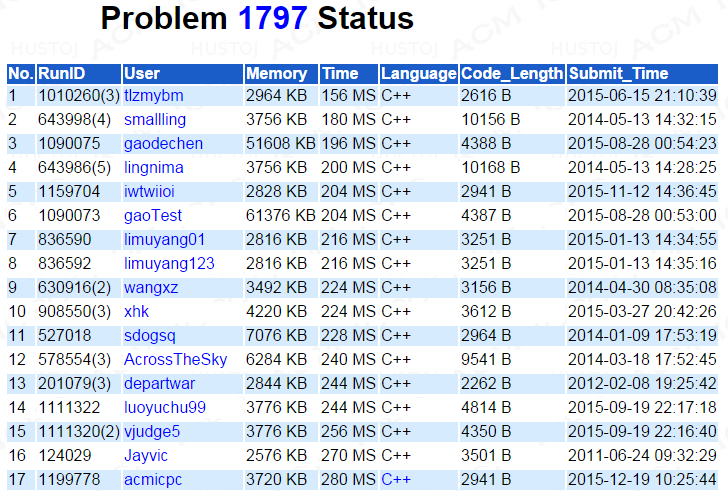BZOJ1797 [AHOI2009] Mincut 最小割
题目链接:http://www.lydsy.com/JudgeOnline/problem.php?id=1797
Description
A,B两个国家正在交战,其中A国的物资运输网中有N个中转站,M条单向道路。设其中第i (1≤i≤M)条道路连接了vi,ui两个中转站,那么中转站vi可以通过该道路到达ui中转站,如果切断这条道路,需要代价ci。现在B国想找出一个路径切断方案,使中转站s不能到达中转站t,并且切断路径的代价之和最小。 小可可一眼就看出,这是一个求最小割的问题。但爱思考的小可可并不局限于此。现在他对每条单向道路提出两个问题: 问题一:是否存在一个最小代价路径切断方案,其中该道路被切断? 问题二:是否对任何一个最小代价路径切断方案,都有该道路被切断? 现在请你回答这两个问题。
Input
第一行有4个正整数,依次为N,M,s和t。第2行到第(M+1)行每行3个正 整数v,u,c表示v中转站到u中转站之间有单向道路相连,单向道路的起点是v, 终点是u,切断它的代价是c(1≤c≤100000)。 注意:两个中转站之间可能有多条道路直接相连。 同一行相邻两数之间可能有一个或多个空格。
Output
对每条单向边,按输入顺序,依次输出一行,包含两个非0即1的整数,分 别表示对问题一和问题二的回答(其中输出1表示是,输出0表示否)。 同一行相邻两数之间用一个空格隔开,每行开头和末尾没有多余空格。


先跑一遍最大流
学到新姿势:跑最大流后Tarjan缩点
1. 如果一条边满流,且起点和终点不在一个SCC内,则存在一个最小割方案该边;
2. 如果一条边满流,且起点在源点SCC内,终点在汇点SCC内,则任意一个最小割包括该边。

1 #include <iostream> 2 #include <cstdio> 3 #include <algorithm> 4 #include <cstring> 5 #include <queue> 6 #include <stack> 7 #define rep(i,l,r) for(int i=l; i<=r; i++) 8 #define clr(x,y) memset(x,y,sizeof(x)) 9 #define travel(x) for(Edge *p=last[x]; p; p=p->pre) 10 using namespace std; 11 const int INF = 0x7fffffff; 12 const int maxn = 4010; 13 struct Edge{ 14 Edge *pre,*rev; int from,to; int cost; 15 }edge[120010]; 16 Edge *last[maxn],*cur[maxn],*pt; 17 int n,m,x,y,z,S,T,ans=0,dfsclock=0,scc=0,d[maxn],dfn[maxn],low[maxn],belong[maxn]; 18 bool isin[maxn]; 19 queue <int> q; 20 stack <int> s; 21 inline int read(){ 22 int ans = 0, f = 1; 23 char c = getchar(); 24 while (!isdigit(c)){ 25 if (c == '-') f = -1; 26 c = getchar(); 27 } 28 while (isdigit(c)){ 29 ans = ans * 10 + c - '0'; 30 c = getchar(); 31 } 32 return ans * f; 33 } 34 inline void addedge(int x,int y,int z){ 35 pt->pre = last[x]; pt->from = x; pt->to = y; pt->cost = z; last[x] = pt++; 36 } 37 inline void add(int x,int y,int z){ 38 addedge(x,y,z); addedge(y,x,0); last[x]->rev = last[y]; last[y]->rev = last[x]; 39 } 40 bool bfs(){ 41 while (!q.empty()) q.pop(); 42 clr(d,-1); d[S] = 0; q.push(S); 43 while (!q.empty()){ 44 int now = q.front(); q.pop(); 45 travel(now){ 46 if (d[p->to] == -1 && p->cost > 0){ 47 d[p->to] = d[now] + 1; 48 q.push(p->to); 49 if (p->to == T) return 1; 50 } 51 } 52 } 53 return 0; 54 } 55 int dfs(int x,int flow){ 56 if (x == T || (!flow)) return flow; int w = 0; 57 for(Edge *p=cur[x]; p && w < flow; p=p->pre){ 58 if (d[p->to] == d[x] + 1 && p->cost > 0){ 59 int delta = dfs(p->to,min(p->cost,flow-w)); 60 p->cost -= delta; 61 p->rev->cost += delta; 62 w += delta; 63 if (p->cost) cur[x] = p; 64 } 65 } 66 if (w < flow) d[x] = -1; 67 return w; 68 } 69 void tarjan(int x){ 70 dfn[x] = low[x] = ++dfsclock; 71 isin[x] = 1; s.push(x); 72 travel(x) if (p->cost){ 73 if (!dfn[p->to]){ 74 tarjan(p->to); 75 low[x] = min(low[x],low[p->to]); 76 } 77 else if (isin[p->to]) low[x] = min(low[x],dfn[p->to]); 78 } 79 if (low[x] == dfn[x]){ 80 scc++; 81 while (s.top() != x){ 82 isin[s.top()] = 0; 83 belong[s.top()] = scc; 84 s.pop(); 85 } 86 isin[x] = 0; belong[x] = scc; s.pop(); 87 } 88 } 89 int main(){ 90 n = read(); m = read(); S = read(); T = read(); 91 clr(last,0); pt = edge; 92 rep(i,1,m){ 93 x = read(); y = read(); z = read(); 94 add(x,y,z); 95 } 96 while (bfs()){ 97 rep(i,1,n) cur[i] = last[i]; 98 dfs(S,INF); 99 } 100 clr(dfn,0); clr(isin,0); rep(i,1,n) if (!dfn[i]) tarjan(i); 101 for (Edge *p=edge; p<=pt-2; p += 2){ 102 if (p->cost) printf("0 0\n"); 103 else{ 104 if (belong[p->from] != belong[p->to]) printf("1 "); 105 else printf("0 "); 106 if (belong[p->from] == belong[S] && belong[p->to] == belong[T]) 107 printf("1\n"); else printf("0\n"); 108 } 109 } 110 return 0; 111 }




